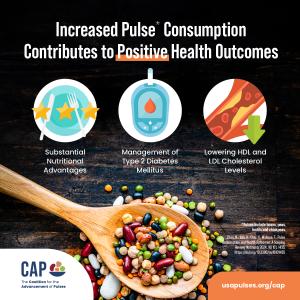New Scientific Review Shows Numerous Links Between Pulse Consumption and Positive Health Outcomes
Eating More Pulses Reduces Risk of Type 2 Diabetes and Heart Disease
MOSCOW, IDAHO, USA, July 11, 2024 /EINPresswire.com/ -- A newly published scoping review in Nutrients consistently underscores the integral role of pulses (beans, peas, lentils and chickpeas) in the management of Type 2 Diabetes Mellitus (T2DM) and corroborates the beneficial effects of pulses on key cardiovascular biomarkers, such as LDL cholesterol and HDL cholesterol. A scoping review is an assessment and synthesis of the breadth of research available on a particular topic and is often used to help policymakers decide when evidence is sufficient for more in-depth analyses (i.e., systematic reviews) to make public health recommendations. This latest review adds to the body of evidence that substantiates the need for more research and future dietary guidance around increasing pulse consumption within healthful dietary patterns.
This assessment aimed to examine the amount and types of evidence available around how pulses contribute to overall human health. Researchers identified thirty articles that studied lentils, chickpeas, common bean varieties (e.g., pinto, black, navy, red, kidney), black-eyed peas, cowpeas and split peas. The health outcomes in these studies were multifaceted, ranging from lipid profiles to blood pressure, cardiovascular disease risk and mortality, type 2 diabetes and glycemic control, metabolic syndrome indicators, inflammatory markers, oxidative stress biomarkers, and hormonal profiles. The most frequently assessed study outcomes included changes in low-density lipoprotein cholesterol, high-density lipoprotein cholesterol, systolic blood pressure, diastolic blood pressure, fasting blood sugar, hemoglobin A1c, waist circumference, and C-reactive protein or high-sensitivity C-reactive protein.
“This scoping review highlights the potential role of pulses in maintaining health and preventing chronic disease,” states author Taylor C. Wallace, PhD, CFS, FACN, Principal and CEO at the Think Healthy Group and an Adjunct Associate Professor in the School or Medicine and Health Sciences at George Washington University. “The studies examined underscore the potential of pulse consumption for enhancing long-term health, particularly among individuals with chronic conditions like Type 2 Diabetes Mellitus and Cardiovascular Disease. It provides a compendium of evidence that supports enhanced dietary guidance around consumption of pulses as part of a healthy dietary pattern.” Funding for this study was provided through an unrestricted educational grant from the American Pulse Association, who had no role in the study design, execution, or writing of the manuscript.
Interventional studies, which have the largest sample sizes for examining lipid profiles, corroborate the beneficial effects of pulses on key cardiovascular biomarkers, such as LDL cholesterol and HDL cholesterol. Interventions where pulses either replaced red meat or were added as fixed servings demonstrated pulses’ efficacy in dietary quality enhancement and favorable health outcomes. Research has shown that eating pulses can help prevent heart disease, attributed in part to the lowering effect of adequate pulse consumption on both total and LDL-cholesterol levels. Pulses’ low-fat content and presence of healthy mono- and polyunsaturated fats, along with a spectrum of essential micronutrients and bioactive compounds with antioxidant properties, further establish pulses as a nutritional powerhouse.
Studies that follow groups of people over time (cohort) demonstrate a reduction in Type 2 Diabetes Mellitus risk with increased pulse consumption. This is further supported by interventional studies that consistently document improvements in fasting glucose levels and insulin sensitivity when pulses are incorporated into diets. Eating pulses may help with the prevention of diabetes and the management of blood glucose levels. Research shows that eating pulses can help manage blood glucose/improve glycemic control by improving insulin sensitivity and lowering A1c.
“This research accentuates the fact that pulses are beneficial for health in so many ways, underscoring dietary guidelines that endorse plant-based eating patterns,” said Tim McGreevy, CEO, of USA Pulses. “The Dietary Guidelines for Americans 2020 – 2025 and the USDA’s Choose My Plate indicate that beans, chickpeas, peas, and lentils can be considered as part of the vegetable or protein groups.”
Pulses are an excellent source of plant protein, fiber, folate and potassium and serve as a rich source of minerals (zinc, iron, calcium, magnesium) and are therefore vital in diets that prioritize plant-based sources of nutrients. , , ,
####
ABOUT THE COALITION FOR THE ADVANCEMENT OF PULSES
The Coalition for the Advancement of Pulses (CAP) is an initiative led by the American Pulse Association (APA) with support from the USA Dry Pea and Lentil Council (USADPLC), the U.S. Dry Bean Council (USDBC), and the Pulse Foundation. The CAP coalition represents a collective of pulse crop growers, processors, manufacturers, and related organizations. CAP is committed to increasing the consumption of pulses in the United States by increasing research on the nutritional benefits of pulses and growing awareness about the many health benefits of pulse crops. For more information visit usapulses.org or contact CAP@usapulses.org
Maureen Bergen
The Ginger Network
+1 703-975-7740
email us here
Visit us on social media:
Facebook
X
LinkedIn
Instagram
YouTube
Legal Disclaimer:
EIN Presswire provides this news content "as is" without warranty of any kind. We do not accept any responsibility or liability for the accuracy, content, images, videos, licenses, completeness, legality, or reliability of the information contained in this article. If you have any complaints or copyright issues related to this article, kindly contact the author above.

